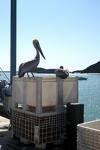Ayad Allawi
More than a month after Iraq's parliamentary elections on March 7, Iraq's politicians still have not been able to form a government. "Protracted negotiations over who will lead the country are still underway, even in the face of a recent spate of violence and terrorist attacks in the street," reports Center for American Progress Senior Fellow Brian Katulis. Incumbent Prime Minister Nouri al-Maliki's State of Law coalition received two fewer seats than the Iraqiyya coalition, which is led by former interim Iraqi prime minister Ayad Allawi, a secular Shiite. Iraqiyya draws much of its support from secular nationalist Sunnis, though one of its leading figures, Tareq al-Hashemi, currently Iraq's most senior Sunni Arab official who, until recently, led the religious Iraqi Islamic party. Reports indicated that the Iraqi National Alliance -- a coalition made up largely of religious Shiites and led by the Sadrist party of Muqtada al-Sadr -- and Maliki's State of Law coalition were close to a merger, which "would put the combined bloc within two seats of the 163-seat majority needed to form a government." Journalist Gregg Carlstrom notes, however, that the parties "still need to decide who's going to be the prime minister," as the Sadrists have made clear that they oppose Maliki. On Wednesday, Allawi "warned that the country could slide into a sectarian war if his group is shut out of the next government and said the United States should work more aggressively to prevent that from happening."
THE ROLE OF IRAN AND SAUDI ARABIA: Though some have called the recent elections "a defeat for Iran," Iran's continuing influence in Iraq was demonstrated by the fact that Iraq's leading Shiite and Kurdish parties all sent delegations to Tehran after the elections. On April 9, the Iranian government called on Iraqi leaders "to include Sunnis in the long-overdue new government and said Shiites would have to form an alliance with them for that to happen." The statement marked a shift for Iran, which has long supported a Shia-dominated Iraq and whose influence is believed to have been behind the attempt by Iraq's de-Baathification commission to disqualify large numbers of Sunni candidates in the weeks leading up to the election. An Iraqiyya delegation also visited Iran this week in order to secure Iranian government support for Iraqiyya-led government. At the same time, Iraqi vice president Tareq al-Hashemi visited Saudi Arabia for talks with Saudi King Abdullah. Hashemi's visit to Riyadh "follows similar trips by leading Iraqi politicians from all communities" -- Kurdish and Shiite as well as Sunni Arab, including Ammar al-Hakim, leader of the Shiite Islamic Supreme Council of Iraq (ISCI). ISCI has strong ties to Iran, and also enjoyed the early backing of the U.S. coalition government, but has fared poorly in subsequent elections. Predominantly Sunni Saudi Arabia "is most concerned about Shiite arch-rival Iran's potential influence over any Baghdad administration."
CONTINUING TENSIONS: Iraq continues to face a number of serious problems. Though violence has stayed down from its 2006-7 peak, Iraq still regularly experiences terrorism. A recent study "found Iraq the number one country in the world most at risk for terrorist attacks." Though al Qaeda in Iraq has been significantly weakened, it retains the ability to carry out massively destructive acts like the recent bombings of the Iranian and German embassies and the Egyptian Consulate, which killed 41 and wounded 237. A recent report from Refugees International also said that "Iraq faces a dire humanitarian crisis as huge numbers of displaced Iraqis struggle to survive in squalid camps." The United Nations estimates that some 4.7 million Iraqis have been displaced since the 2003 invasion of Iraq. "Of the 1.5 million internally displaced people (IDPs) forced from their homes in 2006 and 2007," the report said, "33 percent or 500,000 live as squatters in slum areas." Tensions between Iraqi Arabs and Kurds remain high, especially over the status of oil-rich Kirkuk.
MAINTAINING THE DRAWDOWN: Some analysts have argued that Iraq's continuing problems show the need for the U.S. to slow its drawdown of troops from the country. Tom Ricks, a Senior Fellow at the Center for a New American Security, wrote recently that "probably...the best course" for Obama would be to "break his campaign promises about ending the war, and to offer to keep tens of thousands of troops in Iraq for several more years." The Brookings Institution's Ken Pollack wrote last month that one problem Obama faces is a domestic political base that is "fanatical that he keep to this drawdown schedule regardless of what happens in Iraq." But, as Katulis notes, "If anyone is 'fanatical' about adhering to the troop withdrawal timelines, it is the Iraqis. Iraq's leaders demanded a clear timeline for troop withdrawals in its negotiations with the Bush administration, and there are strong political actors in Iraq who are demanding an end to what they view as an 'occupation.'" One of the most important moments in the consolidation of sovereign Iraqi political authority was the U.S. military's withdrawal from Iraq's cities, celebrated all over the country as Iraqi Sovereignty Day. "The United States should carefully monitor the situation inside Iraq as it continues the troop withdrawal outlined by the Bush administration," Katulis writes, "but it would be unwise to look for excuses to stay longer than Iraqis want."
There is nothing civil about civil wars!


.jpg)